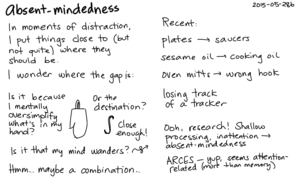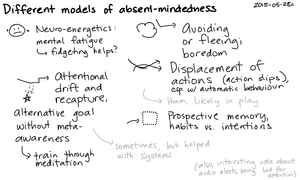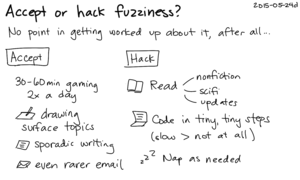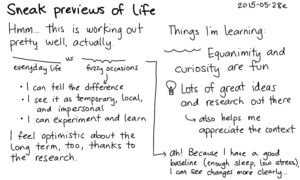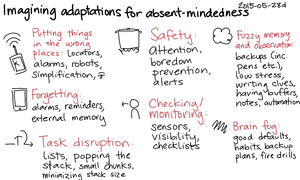Leaning into absent-mindedness
Posted: - Modified: | kaizen, researchFrom time to time, I notice a spike in the number of small mistakes I make due to inattention. It's a good sign to slow things down, rejig systems and habits, and figure out how to make things better. For example, noticing that I often lost track of small things I was carrying around, I switched to a belt bag in summer and a vest in winter.
There are still quite a few slips I haven't figured out how to work around, like the occasional times I put the oven mitts on the opposite side of the stove from where they usually are (I must have absentmindedly thought "Aha! An empty hook!"), or the time I tucked the sesame oil into the fridge. ("I'm holding a bottle; many bottles go into the shelves on the fridge door; this probably goes into the shelves on the fridge door.")
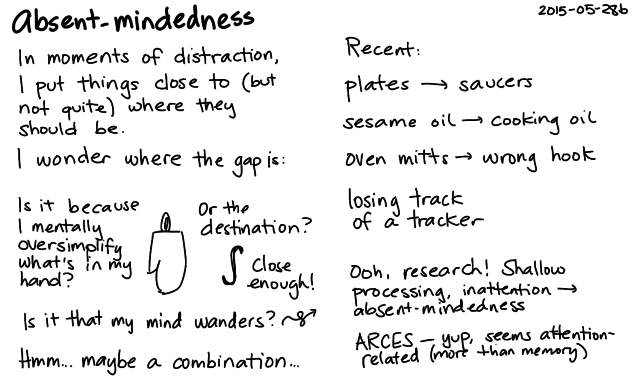
It turns out that there are lots of forms of absent-mindedness. Cheyne, Carierre, and Smilek (2005) defined a scale for attention-related cognitive errors (ARCES) that goes like this:
- I have absent-mindedly placed things in unintended locations (e.g., putting milk in the pantry or sugar in the fridge).
- When reading I find that I have read several paragraphs without being able to recall what I read.
- I have misplaced frequently used objects, such as keys, pens, glasses, etc.
- I have found myself wearing mismatched socks or other apparel.
- I have gone into a room to get something, got distracted, and left without what I went there for.
- I fail to see what I am looking for even though I am looking right at it.
- I begin one task and get distracted into doing something else.
- I have absent-mindedly mixed up targets of my action (e.g. pouring or putting something into the wrong container).
- I make mistakes because I am doing one thing and thinking about another.
- I have gone to the fridge to get one thing (e.g., milk) and taken something else (e.g., juice).
- I have to go back to check whether I have done something or not (e.g., turning out lights, locking doors).
- I go into a room to do one thing (e.g., brush my teeth) and end up doing something else (e.g., brush my hair).
I find that I tend to be okay at broad strokes (intentions), but sometimes I miss finer details. I've walked out of the house in inside-out or back-to-front clothing before (technical shirts feel the same either way!), although usually W- helps me catch those situations.
It's not that bad, though. Although I sometimes don't remember what I walked into a room for (especially if I get distracted by a conversation part way), I can almost always recall what I intended to do, and what was before that (if I hadn't finished that yet). It also helps to have the habit of writing down quick notes and consulting my agenda for tasks to work on, but mental rehearsal is usually enough for me to "pop the stack".
Fortunately, all this appears to be normal human experience. I might be a smidge more absent-minded than some folks, but it doesn't get in the way of life, and even W- forgets a mug of hot water in the microwave occasionally. Besides, I enjoy working around the limitations of my brain by taking notes and tweaking the way I live.
This is probably why I enjoy reading research into the brain. It turns out that there are many possible explanations for absent-mindedness. There are different ways to measure it, and even a few ways to play around with it.
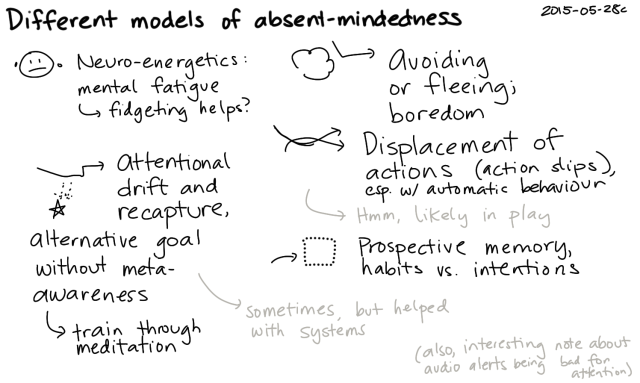
When I read through the research, I feel oddly optimistic. Even though I know I'm likely to get more absent-minded as I grow older, I also know that experience, mindfulness, more deliberate responses, and good habits using external-memory systems can help a lot.
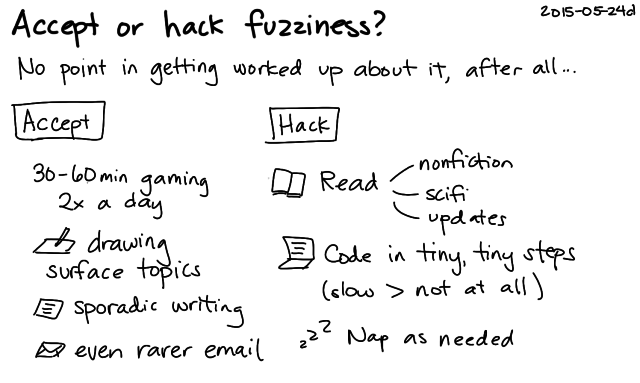
I notice that I respond to the fuzziness in my brain with curiosity instead of frustration. I like this attitude, and I hope to keep it as I go through life. Instead of getting frustrated with myself, I get a good laugh out of the little mishaps (oh hey, I've put the plates where the saucers usually go; I can see how that happened!), and I explore it to learn more. So a bit of both, I guess: accept the fuzziness and hack around it.
Besides, the incidents aren't that frequent. They're just more prominent in my memory because I pay attention to them. =)
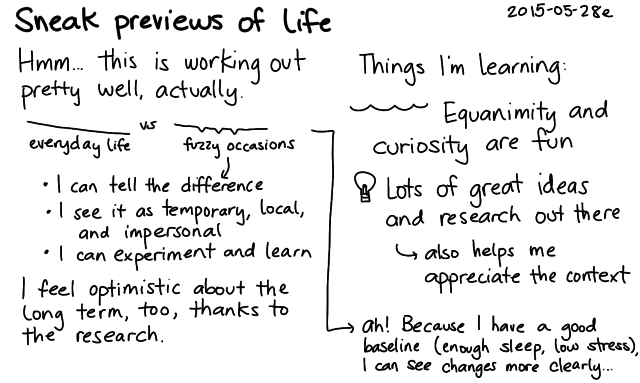
Actually, it works out really nicely that I'm thinking about this at this time. I know people around me also experience absent-mindedness, so I don't have to have a hypochrondiac's worry about early-onset diseases. (Although if we get to the point where this does actually get in the way of an awesome life, I'll be sure to ask for help.) Instead, since I keep my life relatively smooth (low stress, plenty of sleep), I have a baseline of feeling good. That lets me notice changes more clearly, instead of the changes getting obscured in the noise of perpetual sleep deprivation or constant background stress. It also means that I can think of fuzzy-brain moments as temporary, local, and impersonal, and I can use my non-fuzzy times to figure out how to make the fuzzy times even better.
What are some things that could make absent-minded moments better?
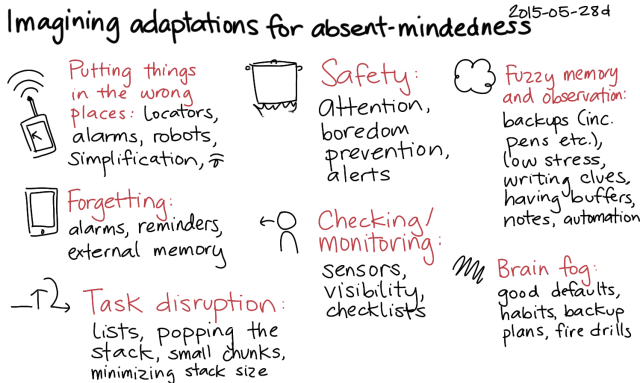
I might need to wait for better technology for some of these ideas, but most of the ideas are ready to go. Putting things in the wrong places is a minor inconvenience, and safety hasn't been a big issue for me yet. I'll probably focus on fuzzy memory and observation, looking for ways to take notes on or automate the things I do. For example, I've added notes on how to find and deploy code to the TODO lists for my personal projects, since I might go a few months without thinking about them. Notes also help with checking and monitoring. As I gain more experience and develop those systems and habits, that will help with brain fog as well. I trust my lists to help me with task disruption, and I keep lots of buffers in my life to soften the impact of forgetting. It's a fascinating balance between taking things slowly and keeping things interesting enough so that my brain doesn't go into too much of an automatic mode.
It's odd how taking this kind of perspective changes how I experience forgetfulness. Instead of thinking to myself, "Where did I put those keys? I suck!", I find myself thinking, "Oh look! I wonder what I'll learn from this one…" We'll see!

